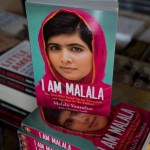
Citing safety concerns, organisers have decided to cancel an event planned to launch the release of ‘I Am Malala’, the autobiography of Pakistani schoolgirl Malala Yousafzai who was shot in the head by Pakistani Taliban terrorists in 2012 for speaking out in favour of girls’ education.
Officials at Peshawar University said that ministers in the provincial government of Khyber-Pakhtunkhwa (KP) had applied political pressure to cancel the ceremony to promote the multi award-winner’s memoir, which relates Malala’s experiences as a schoolgirl advocate and her life since surviving the attempted assassination. The book, which was published last year, is a bestseller in the West but is not widely available in Pakistan, especially in the conservative northwest where many institutions have banned it.
A spokesperson for Bacha Khan Education Trust told BBC Urdu: “Two ministers of the KP government put pressure on the university administration to call off the programme. Some important state functionaries also made telephone calls to senior professors of the Area Study Centre.”
Defending the decision to cancel the launch, Shah Farman, Information Minister of the Khyber-Pakhtunkhwa province, said: “It is true that we stopped them and there were many reasons for that.
“The issue was of a suitable platform and security,” he said in a statement. “Malala’s book is an autobiography, and it has nothing to do with the Area Study Centre, or any educational institution for that matter.”
Critics of the decision include Imran Khan, the national leader of the PTI, one of the political parties that governs the province. The former cricket hero-turned-politician wrote on Twitter: “I am at a loss 2 understand why Malala’s book launch stopped in Peshawar”. Using the initials for his Pakistan Justice Party, he added, “PTI believes in freedom of speech/debate, not censorship of ideas.”
The episode was the second this month in which Mr. Khan found himself obliged to publicly criticise his party’s officials in the region. Earlier on this month he admonished the provincial government for refusing to acknowledge the bravery of a teenage boy who was blown up trying to stop a suicide bomber at his school in Hangu (African Voice, Issue 515).
Still only 16, Malala Yousafzai is able to boast a number of significant plaudits. Even before the attempt on her life that made her a household name, she was awarded the first Pakistani National Youth Peace Prize and was runner-up for the 2011 International Children’s Peace Prize, the first Pakistani girl to ever be nominated for it. She went on to win the prize in 2013.
In 2012, TIME magazine selected her as runner-up in that year’s Person of the Year and named her amongst their ‘100 Most Influential People’ the following year. Also in 2012, she was awarded France’s Simone de Beauvoir Prize for Women’s Freedom and The Times of London named her “Young Person of the Year” for heroism ‘not only beyond her years, but almost beyond belief.’
She became the youngest ever nominee for the Nobel Peace Prize in 2013 and in the same year was awarded the Sakharov Prize for Freedom of Thought by the 766-strong European Parliament.
Following the 2012 attack that almost killed her, Malala was flown to the UK to continue the life-saving emergency care she received in Pakistan. Unable to return because of the continuing threat to her life, she now resides in Birmingham with her family.








